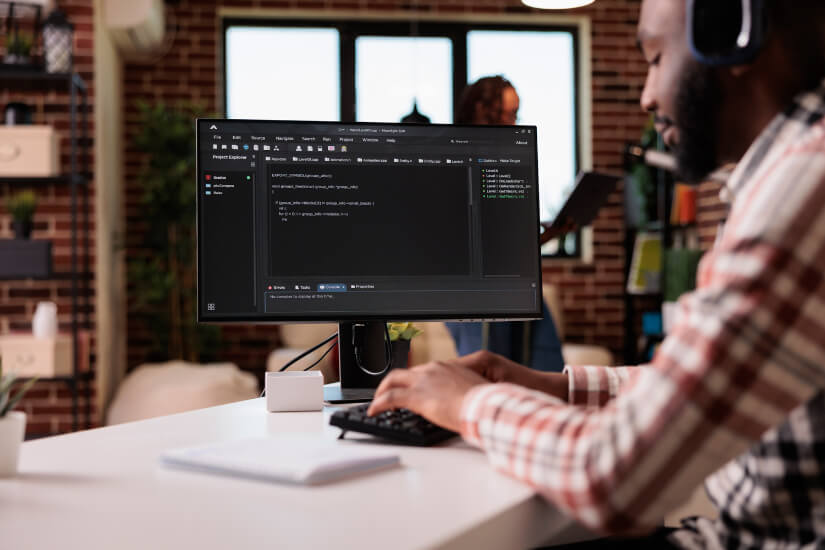Coding Freedom: The Value of Learning at Your Own Speed
Learning to code is an exciting journey that opens up a world of possibilities. Whether you're interested in web development, mobile app creation, or data analysis, coding skills are in high demand in today's job market. However, it's crucial to approach coding with the right mindset and understand the importance of learning at your own pace.
Many aspiring programmers feel pressured to rush through their learning process, often comparing themselves to others who seem to grasp concepts faster or complete projects more quickly. This can lead to frustration, burnout, and ultimately hinder progress. Here are a few reasons why it's important to learn to code at your own rythm:
1. Understanding the Fundamentals
When you learn to code at your own speed, you have the opportunity to fully understand the fundamental concepts of programming. Rushing through lessons or skipping important topics can leave gaps in your knowledge, making it difficult to build upon that foundation in the future. Taking the time to grasp the basics will set you up for success as you progress to more advanced topics.

2. Retaining Information
Learning to code is like learning a new language. It requires practice, repetition, and time for the information to sink in. By learning at your own rythm, you give yourself the opportunity to reinforce what you've learned and allow the concepts to become ingrained in your memory. This will make it easier to recall information when you encounter similar problems or concepts in the future.
3. Building Problem-Solving Skills
Coding is all about problem-solving. It's about breaking down complex tasks into smaller, more manageable steps. By learning at your own pace, you can develop your problem-solving skills organically. Rushing through coding challenges or projects may result in a superficial understanding of the problem-solving process. Taking your time allows you to practice critical thinking and develop effective strategies for approaching coding problems.

4. Reducing Overwhelm
Learning to code can be overwhelming, especially when you're bombarded with new concepts, syntax, and frameworks. Trying to learn everything at once can quickly lead to burnout and frustration. By learning at your own rythm, you can break down complex topics into smaller, more manageable chunks. This approach allows you to focus on one concept at a time, reducing overwhelm and increasing your chances of success.
5. Embracing Creativity
Coding is not just about following instructions and writing lines of code. It's a creative process that allows you to bring your ideas to life. When you learn at your own rythm, you have the freedom to explore different coding techniques, experiment with new ideas, and find your unique coding style. Embracing creativity in coding can lead to innovative solutions and a deeper understanding of programming concepts.

Learning to code is a personal journey, and it's important to remember that everyone learns at their own speed. By taking the time to understand the fundamentals, retain information, build problem-solving skills, reduce overwhelm, and embrace creativity, you'll be setting yourself up for long-term success in your coding journey. So, don't compare yourself to others and enjoy the process of learning and growing as a programmer.
Posts you might like
- Navigating the Tech Job Market: Insights from Sabio Alumni and Cybersecurity Opportunities
- Embracing the Climb: A Leader's Growth Mindset Journey
- This is the Perfect Time to Dive into Coding and Automation, This is Why!
- Troubleshoot Like a Pro: The Art of Debugging in Programming
- Beyond Bootcamp: Diverse Career Avenues in Tech
- Spotting Burnout in Tech Job Hunts: 6 Warning Signs & Ways to Overcome It
- Get Hired: Essential Knowledge for Emerging Programmers
- 7 Steps to Build a Personalized Continuous Learning Plan for Coders
- Empower Your Journey: Benefits of Remote Code Bootcamps
- Proactive Steps: Daily Rituals for the Job-Hunting Programmer
- Don't Sabotage Your Tech Job Search: Mistakes to Skip
- Unleashing Opportunities: How Bootcamp Career Services Propel Success
- From Lines to Offers: How Your Coding Experience Shapes Market Value
- Optimizing Success: Your Attitude in Coding Bootcamps
- Roadmap to Success: Tech Job Hunt with a Coding Bootcamp Mentor
- Crafting Your Tech Startup Roadmap from Bootcamp Grad
- Tips for Creating a Resume That Gets Interviews for High-Experience Jobs After Coding Bootcamp
- Accelerate Your Career: Embrace Bootcamps for Real-World Programming Skills
- The Coding Craft: Essential Skills Learned at Bootcamps
- Bootcamp Bonds: Tapping into Networks for Tech Employment
- Coding Confidence Booster: The Benefits of Coding Mock Interviews
- Programming by the Clock: The Impact of Effective Time Management
- Coding Freedom: The Value of Learning at Your Own Speed
- Calm Code Journey: Overwhelm-Free Bootcamp Success
- Polish Your Pitch: Tech Interview Communication Essentials
- Inside the Loop: Coding Bootcamps and Tech Industry Strategies
- From Zero to Hired: Decode the Experience Question in Tech Interviews
- Solving the Puzzle: Refining Your Problem-Solving as a Programmer
- The Art of Practicality: Using Coding Languages Without Overlearning
- Practice Makes Perfect: The Key to Software Engineering Brilliance



